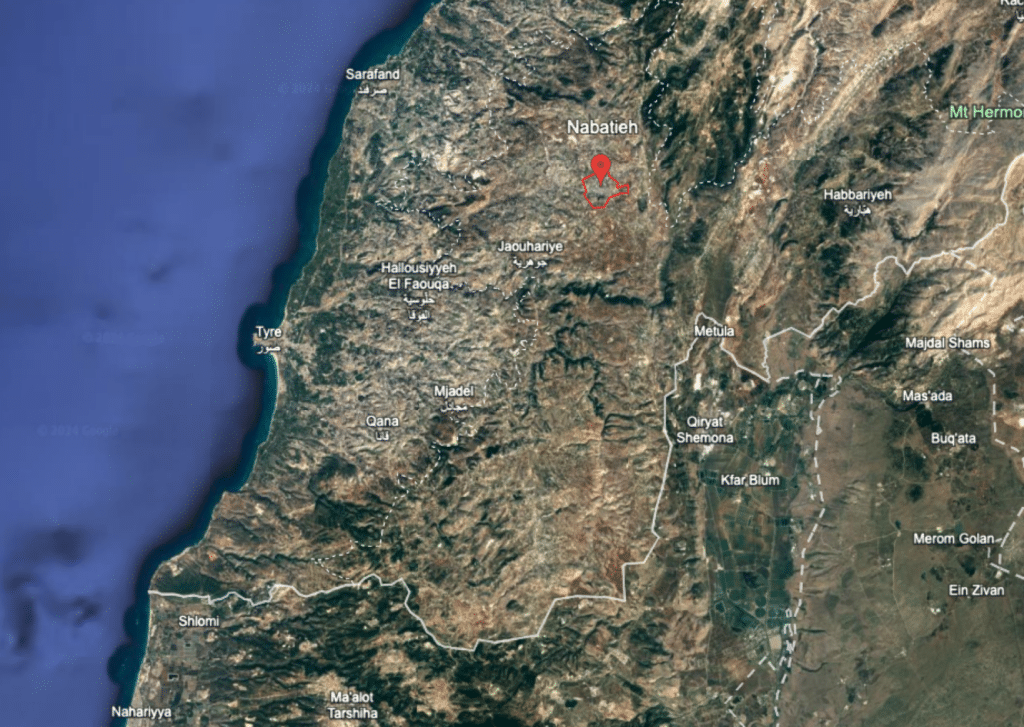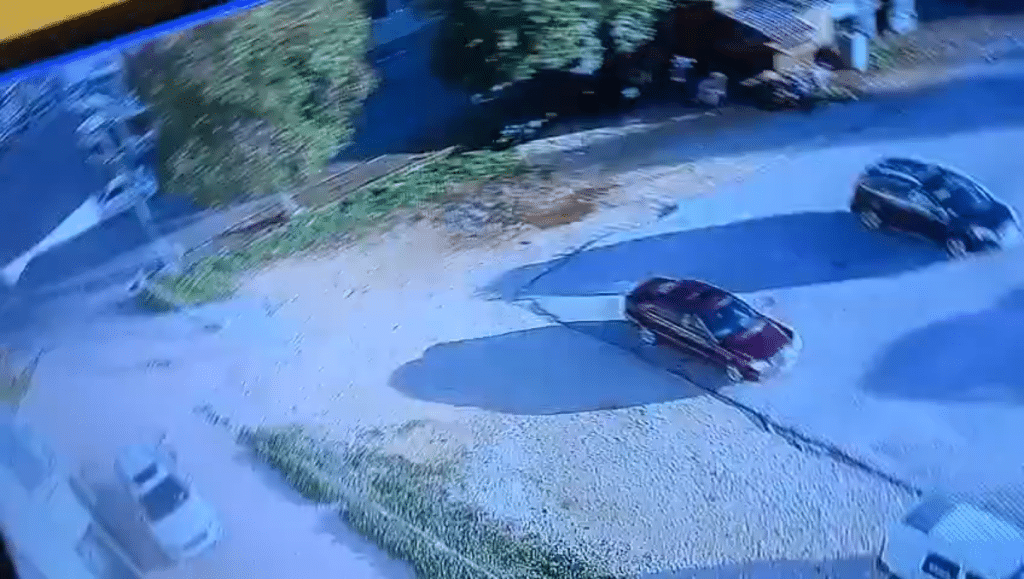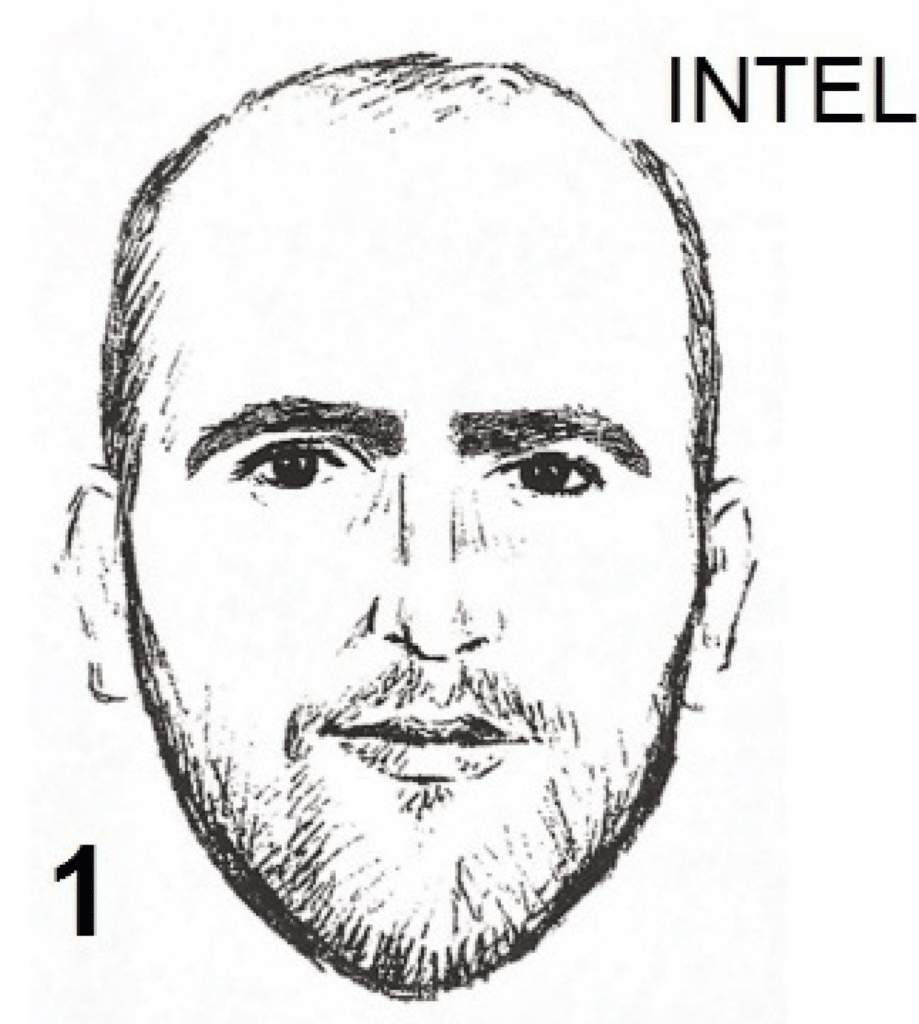February 8, 2024 | FDD's Long War Journal
Israel attempts to assassinate two high-ranking Hezbollah commanders in south Lebanon
February 8, 2024 | FDD's Long War Journal
Israel attempts to assassinate two high-ranking Hezbollah commanders in south Lebanon
On Thursday evening, at approximately 4:30 PM local time, media outlets began reporting on a possible Israeli drone strike in south Lebanon. The details of the strike were slightly unusual. The strike occurred in the city of Nabatieh in south Lebanon, which sits approximately 8 km north of the Litani River. This was the first Israeli strike in the city since the 2006 war with Hezbollah.

Shortly before the strike, at approximately 3:53 PM local time, Al-Manar’s correspondent Ali Choeib had reported the presence of Israeli Hermes 450 and 900 “Kochav” drones “conspicuously circling above Al-Nabatieh and Al-Zahrani” and continued to conduct “concentrated overflights” until approximately 4:26 PM – minutes before the attack occurred. Then, the Israeli drones targeted a black Hynduai SUV while it was traveling on Mahmoud Faqih Street, in the midst of Nabatieh. The initial strike, according to NNA Lebanon, missed its target and landed in an open area. However, as the car approached the statute of Hassan Kamel al-Sabbah, at Nabatieh’s northern entrance, its occupants escaped and ran away on foot, upon which the drones fired again, destroying the car.

Details regarding the outcome of the strike remain murky. Initial reports were inconsistent on the number of the car’s occupants – some reported two, others three – but there was a consensus that they were members of Hezbollah.
As of the time of this writing, neither the Israel Defense Forces nor Hezbollah’s main media outlets – Al-Manar, Al-Mayadeen, Al-Nour – and its military media have mentioned the strike at all, let alone details about the intended targets, despite each side reporting their other respective attacks from the day. While this suggests that the car’s occupants were high-value target members of Hezbollah, it also complicates identifying them or determining their fates with certainty.
Based on what can reasonably be determined, however, the car was carrying Abbas al-Debes, aka “Al Hajj Abdullah,” and one other companion who has not been named. Al-Debes’ existence and role in Hezbollah were first revealed in September of 2022 by the blog IntelliTimes, which reported that Al-Debes – then 43 years old, and from Nabatieh – was an operative within Hezbollah’s Unit 1800 and was aiding the Iranian aerial defense project in Syria. Nothing else has been revealed about Al-Debes since then, par for the course for the shadowy lives of Hezbollah’s military commanders.

Artist Sketch of Abbas Mohammad al-Debes, courtesy of IntelliTimes
Israeli reports after the strike indicated that Al-Debes had taken on a new role in the interim as a regional commander for the terror group based in his hometown of Nabatieh. An Israeli military source, speaking to media outlets anonymously after the strike, stated that the “operation in Nabatieh targeted the Radwan Unit’s commander in the area of Al-Khiyam” in south Lebanon, suggesting that Al-Debes had assumed a command role in Hezbollah’s elite commando terror force.
While some initial reports indicated that Al-Debes had been killed in the strike, it is unclear as of now whether that was the case. Al-Arabiya and Al-Hadath claimed, based on their own unnamed sources, that Al-Debes had indeed been killed, which was echoed by Galei Tzahal reporter Doron Kadosh. But an unnamed Lebanese security source told AFP one occupant of the car “was seriously wounded” in the strike, while his “companion was also injured.” Apparently, a third person, a bystander, was also wounded in the strike. Indeed, other outlets claimed that the seriously wounded occupant was pulled from the wreckage wearing a military uniform and immediately transferred to Al-Najda al-Chaabiyeh Hospital, approximately 1.5 km north of the attack’s location, and from there to Hezbollah’s Sheikh Ragheb Harb University Hospital, 6 km away in the nearby village of Toul, where he was immediately admitted for surgery. This was confirmed later in the day by Annahar, which reported that the “two Hezbollah members targeted by an Israeli drone strike in Nabatieh are now in stable condition, after a successful surgery on the member who was in serious condition.”
Forces under Al-Debes’ command were responsible for anti-tank missile fire targeting the northern Israeli city of Kiryat Shmona and Metula, on the Lebanon-Israel frontier. Earlier that morning, Hezbollah had claimed an attack on Kiryat Shmona that seriously wounded an IDF soldier at Camp Gibor. Camp Gibor serves as the Headquarters of the Hiram Regional Division, responsible for security tasks in the eastern sector of Israel’s border with Lebanon. While an Israeli military spokesman was unable to tell AFP whether Al-Debes was responsible for that morning’s specific attacks on Kiryat Shmona. However, Galei Tzahal reported that Al-Debes had indeed been responsible for that morning’s attacks, while other Israeli military sources – which was echoed by an Israeli military source to Sky News Arabia.
Shortly afterwards, reports began emerging that the other – but primary and actual – intended target of the strike was Ali Karaki, whom media outlets described as a “Hezbollah military commander” but, more significantly, “the general military commander of Hezbollah” and “the highest-ranking military command personality in the Hezb[ollah], and a member of its Jihad Council,” which oversees the group’s whole military apparatus. Those reports indicated that Karaki had survived the Israeli strike, which was the second attempt on his life. It does not appear that Karaki was the Hezbollah member described as wounded but “in serious condition.” Reports indicate that Karaki was not in the car at the time it was struck and had avoided being hit by the drone strike after having successfully camouflaged himself.
Ali Karaki, born on February 25, 1967, is a long-standing member of Hezbollah. In the late 1980s, he allegedly belonged to the Hezbollah cell, which carried out attacks on fifteen targets in Paris between December 1985 and September 1986. Karaki has been counted as a senior leader of Hezbollah’s Jihad Council for at least five years. He previously commanded the Muawaniyeh 105, Hezbollah’s southern command, and was responsible for military operations in south Lebanon. He was born in Ain Bouswar, a village in south Lebanon’s Nabatieh District. He holds both Lebanese and Guinean citizenship, and is also known as Muhammad Ali Karaki and Muhammad Karaki. The United States Department of State designated him as a Specially Designated Global Terrorist (SDGT) in September 2019 for his role in Hezbollah.
It is possible, but highly unlikely, that this Ali Karaki – the target of today’s Israeli strike – is identical to the eponymous individual arrested by Azerbaijan in 2008 over a plot to blow up the Israeli Embassy in Baku in retaliation for the assassination of Hezbollah military commander Imad Mughniyeh. That Ali Karaki, described as a veteran of Hezbollah’s external operations unit, was sentenced to 15 years in prison and disclosed intelligence information regarding his Islamic Revolution Guard Corps (IRGC) contacts – making his reintegration into Hezbollah’s ranks at such a senior level implausible.
Whether or not Israel succeeded in killing Ali Karaki and Abbas Al-Debes, the attempt on the life of two members of Hezbollah as high-ranking as this pair is an unmistakable escalation by the Israelis. The group cannot be expected to remain passive in the face of such a strike, all the most so if they have been killed. But their death or survival is almost secondary to the message that Israel was trying to send its adversaries in Hezbollah – that its patience with the group’s ongoing attacks is running out, and that it should consider none of its leadership safe, irrespective of the consequences.
David Daoud is Senior Fellow at at the Foundation for Defense of Democracies where he focuses on Israel, Hezbollah, and Lebanon affairs.